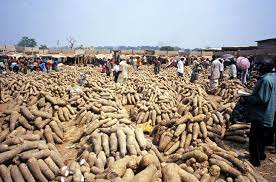Why Nigeria’s Agric Exports Facing Rejections Overseas – Okonjo-Iweala
The World Trade Organisation says Nigeria has lost its leading position in the agriculture export markets because its agricultural commodities do not meet the sanitary and phytosanitary requirements of the foreign markets.
According to WTO, despite the abundance of arable lands and increased investments, the nation has transitioned into a net importer of farm produce that was previously cultivated domestically, undermining efforts aimed at ensuring food sustainability.
The Director-General, WTO, Ngozi Okonjo-Iweala, disclosed this in Abuja at the launch of seven trade support programmes initiated by the WTO-ITC to boost the development of Nigeria’s trade and industry standards.
The initiatives namely the Standards Trade Development Facility, Digital Trade Initiative support, Women Exporters Entrepreneurship support, National Trade Portal and cotton development initiative aim to provide technical support to strengthen food safety, animal and plant health capacity in developing countries, address challenges of e-commerce digital trade divide and establish a world-class technology centre for all trade-related data and information in Nigeria.
She said, “We are launching today with STDF, ITC, and the NEPC, a project to help with international safety and quality certification for sesame and cowpeas or black-eyed peas. The agriculture sector in Nigeria has the potential to be a major driver of export diversification and job creation – but too much of this potential remains unrealized, due to a variety of barriers. In fact, Nigeria has not only lost out in agricultural export markets, it is a net food importer spending about billions a year on goods, many of which we can also produce here. Some of Nigeria’s unrealised potential has to do with trade-related problems on the supply side – and that is what this project is seeking to rectify.”
Specifically, the WTO DG said Nigerian cowpea and sesame exports were increasingly facing rejections in several destination markets due to non-compliance with international SPS requirements.
She said the failure to comply with regional, global and import country sanitary and phytosanitary standards has resulted in loss of sales, revenue, and hard currency due to export rejects.
Last week, the former finance minister charged Nigeria and other African countries to improve the quality of their shea exports to international standards.
She added, “Nigeria is the world’s largest producer and consumer of cowpeas. Sesame is primarily an export crop, and Nigeria is the world’s fourth leading producer, exporting to the EU, Türkiye, Japan, South Korea and other Asian markets. However, Nigerian cowpea and sesame exports have increasingly faced rejections in several destination markets due to non-compliance with international SPS requirements.”
She said for example, “Nigeria accounts for over a third of Japan’s sesame imports – but health and safety inspections during the past few years have found instances where pesticide residue levels were nearly double the maximum residue limits permissible from 2019 to 2021.
Hence to tackle the challenges, Okonjo-Iweala said the WTO was partnering with relevant stakeholders to build the capacities of stakeholders across the sesame and cowpeas value chains to better understand market access requirements and improve agricultural practices such as pesticide application, hygiene techniques, harvest and post-harvest methods, and food safety.





